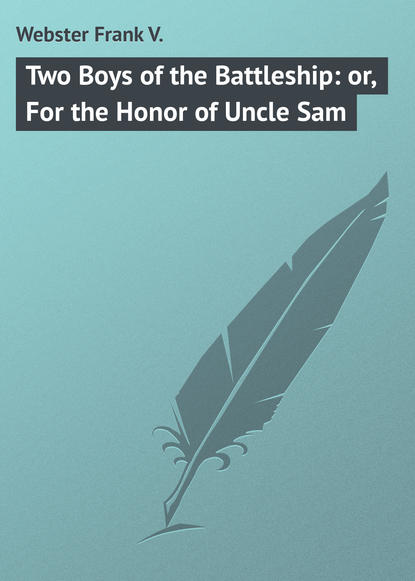По всем вопросам обращайтесь на: info@litportal.ru
(©) 2003-2024.
✖
Two Boys of the Battleship: or, For the Honor of Uncle Sam
Настройки чтения
Размер шрифта
Высота строк
Поля
“Huh! Some new jackies!” remarked one of a group of sailors who watched the arrival of the recruits. “Maybe they won’t be so anxious to be on board once we get to sea,” he sneered.
CHAPTER XII – THE CUT ROPES
“Say, look at those guns!”
“What will happen when she fires a broadside?”
“And cast your eye on those anchor chains!”
“I wouldn’t want to carry even one link!”
“See the double imposed turrets!”
“What a ship she is – a real ship of battle!”
These were only a few of the comments and exclamations that came from Frank, Ned and their shipmates as they boarded the Georgetown, on which they were shortly to make a cruise for practice. And everything they said was justified, for the vessel was the last word in construction for the United States government. In spite of the growing prejudice against big ships, in contradistinction to submarines and torpedo boats, the Georgetown had been built at enormous cost.
To describe her in detail would take up more space than is at our disposal. But most boys have either seen big battleships, or cruisers, or have looked at photographs of them, so have an idea of what they look like. But something larger and more formidable than anything before constructed to deal death and destruction from the sea will have to be imagined.
She had more big guns, and more small quick-firers than any vessel afloat, and as an innovation, her largest calibred rifles, forward and aft, were fifteen inches in diameter, the limit, up to then, having been fourteen inches. An inch may not seem much, but add it to the diameter of a big rifle, and it means that the gun must be very much larger and stronger in proportion, that it needs more powder to send the projectile on its way, and that the projectile is also greatly increased in weight and explosive power.
So it is no wonder our heroes were filled with astonishment and amazement as they gazed about them, once they were on board the craft that was to be their floating home for some time.
“Attention there now!” called a sharp voice, and an officer formed the new recruits in line, and marched them to the quarters where they were to stow their bags and sling their hammocks. Frank, Ned and the others had brought with them their belongings from Norfolk, and these were soon stowed away, in proper ship-shape fashion.
Here was where the long and careful training showed. In spite of the fact that it was their first appearance on the Georgetown, the recruits knew just what to do, and where to put their things.
Of course, ships differ, and some are more comfortable as living places than others, but the same general arrangement prevails on all of the United States battleships.
“When do we sail?” asked Frank of a sailor who had said he had been on the Georgetown since she had been put in commission.
“In a few days now. We’re just waiting for the old man.”
“Old man?” queried Ned.
“The captain,” the sailor explained. “He’s away on shore leave. His daughter got married, I believe, and he’s at the festivities. We’ll get out of here in about a week. Put in to be painted, you know.”
Frank and Ned had read that fact before coming up from Norfolk, and certainly the battleship was spick and span, and as shiny as the sailors could make her, every bit of brass, copper and nickel gleaming in the sun.
Our lads had hammocks next to one another, but it was not with much delight that they noticed that the red-haired bully, Hank Dell, was assigned to the same mess as themselves, his hammock adjoining Ned’s.
“But we won’t bother him if he doesn’t bother us,” Frank said to his brother.
There was not so much to be done aboard the Georgetown while she was in the navy yard as there would be once she was afloat, though there is always a certain amount of routine labor to be performed on a ship when she is in commission and subject to orders at a moment’s notice. In consequence, many of the sailors had been allowed shore leave, and after the first two days, during which they were made to do considerable work to make them familiar with the different parts of the craft, Frank and Ned were allowed a day off.
They went to New York, and strolled down toward the aquarium, hoping they might see the two thieves. But though they spent some time inside the building they were not successful in their quest.
They sent some souvenir postals to their uncle, knowing he would be glad to know that they remembered him. They had written frequently since they had been separated from him.
Seeing the sights of the big city again, after an absence of four months, was much enjoyed by the boys. But, strange as it may seem, they were glad to be back on board again. For they had no home now, and the battleship really filled that place in their hearts. Later on, when their uncle’s affairs should have been straightened out, they would, perhaps, be back in the old homestead.
Captain Decker, in command of the Georgetown, returned about a week after Ned and Frank had reached the vessel, and at once preparations were made for putting to sea. The big craft was to cruise about, and do some target practice off Newport later on.
Life aboard a battleship is very much a matter of routine, with the same thing occurring at the same time every day, save when unexpected drills, such as collision drill, or fire drill, are held, no notice being given of these. This is done to keep the men ever on the alert.
“Well, we’re off!” exclaimed Ned, as he and Frank, with the others of the crew, stood on deck, while the Georgetown steamed slowly out of New York harbor one day. “We’re off!”
“And I wonder what will happen before we get back again!” suggested Frank.
“Maybe there’ll be a war!” cried Ned, his eyes sparkling.
Frank shook his head.
“I don’t believe I want one,” he said slowly. “I’m not afraid, but – ”
“Yes, I know,” answered his brother.
Though Frank and Ned did not actually take part in a war, they were destined to see some fighting, and to see the destructive work of the big guns when fired at what really was an enemy. But of that, more later.
And so, out to sea went the battleship, with our friends aboard. Now began the real work of a man-o’-warsman. Reveille was sounded on a bugle at 5:30 every morning. That meant that every enlisted man who had not been on guard the night before, must jump out of his hammock, lash it up, and prepare himself for breakfast. There was no lagging – no taking a few more “winks,” for only fifteen minutes was allowed for clearing the decks of hammocks. Then coffee or cocoa was served, with bread, or, if the men preferred it, hardtack. And very good this was, too, not like the kind you read of in old-fashioned books, mouldy and full of worms. It was clean and sweet.
Half an hour was allowed for this early meal, and it could be followed by a smoke for those who indulged in tobacco. Frank and Ned did not, however.
At 6:30 all hands were summoned to clean ship. It might seem that this need not be done every day, but it has to be attended to, for a battleship is almost like a small town, and there is always something to be done. The men are told off into divisions, and each man has a certain “station,” the cleanliness of which he is responsible for. Each division, or squad, of men has a certain specified amount of work to do in cleaning ship. One division may have to scrub part of the deck, another will be given boats to clean and make ship-shape, and another will have paint work or brass or copper fittings to polish.
It might be mentioned that following the early morning cup of coffee each man is required to wash his own clothes, for cleanliness is one of the cardinal points in the navy. And matters are so arranged that the cleaning of the ship stops in time for the men to make themselves neat for the breakfast, which is served from 7:30 to 8:15 A. M. For this the men are always in uniform, the nature of their clothing depending on the climate they are cruising in.
As was mentioned, the two brothers had their hammocks slung near that of Hank Dell. Nine o’clock is the hour when all blue-jackets must be in their hammocks, unless allowed to stay up for some entertainment, of which there are many aboard the ships.
At 7:30 A.M. on the first day out, when Frank and Ned went to sling their beds, in readiness for the night, Frank saw Hank near Ned’s lashed hammock.
“Guess you’re making a mistake, aren’t you?” said Frank. “That isn’t yours.”
“Oh, that’s so!” exclaimed Hank, with affected surprise. “I’m a bit green about things here. Mine’s over on this side,” and he went to his own sleeping quarters.
Frank thought no more about it at the time, but slung his own hammock. Ned, coming down a few minutes afterward, did the same. Then, as the time was free up to nine o’clock, the brothers went on deck to enjoy the air, for the day had been hot.
“Say, it’s simply great, isn’t it?” remarked Ned, as he gazed off over the heaving waters, silvered by the moon.
“Couldn’t be better,” declared Frank. “It’s the best life ever!”
The signal came for turning in, and the men, rather regretfully perhaps, went below.
As Ned sprang up into his hammock it gave way with him, and down he came with a crash, turning over so that he fell on deck, off the mattress, bruising himself painfully.
“Hurt?” asked Frank, hurrying to his brother’s side.
“Oh, not so much but that I can stand it,” was the grim answer.










